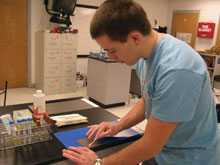The Killing Game: Using Copper to Battle Deadly Bacteria
Missouri teen researches antimicrobial properties of copper
 Michael Stockwell, 18, conducting research at Missouri University of Science and Technology.
Michael Stockwell, 18, conducting research at Missouri University of Science and Technology. High-resolution version of this photo.
When it comes to research projects, Michael Stockwell is a whiz. He won his third-grade science fair with a homemade rocket launcher. Three years later he investigated alternative food sources for Monarch butterflies. Today he's a finalist in a national science competition for his research into copper's ability to kill harmful bacteria. And he's not even out of high school.
This 18 year-old Tuscumbia, Missouri, senior recently claimed first place in another prestigious competition, the Junior Science Engineering and Humanities Symposium (JSEHS), for his antimicrobial research. As a result, he was invited to present his work at the upcoming 2008 National Junior Science Engineering and Humanities Symposium in Orlando.
Stockwell's study, titled The Killing Game: Copper, a Possible Bactericide for Contact Surfaces, examined whether ordinary copper and brass surfaces could be used to limit bacterial growth. Although his research was carried out on a far smaller scale and with a limited budget, the teen scientist's efforts mirror recent multi-year research projects conducted in England and the United States on copper's naturally antimicrobial properties.
In his project, Stockwell replaced the door push-plates in restrooms at three local high schools with uncoated copper, brass and stainless steel plates, then he measured bacterial counts on their surfaces. After 24 hours, each plate was swabbed to collect bacterial samples and the bacterial "loads" were counted. The experiment was conducted over three days.
In addition to this "real world" study, a lab component was included in Stockwell's research. He introduced E. coli and S. epidermidis bacteria to copper, brass and stainless steel samples to test each metal's antimicrobial properties over a given amount of time. The push plates and metal laboratory-grade samples were provided for the experiments by the Copper Development Association, originators of the research upon which Stockwell based his project.
The results were striking. In the school tests, significantly fewer bacteria survived on the copper and brass push plates than on the stainless steel plates. In the laboratory, more than 99 percent of the bacteria on the copper and brass were killed, compared to a substantially lower percent killed on stainless steel.
Dave Westenberg, an associate professor at the Missouri University of Science and Technology, worked with Stockwell on the research project and provided him with lab space to carry out the experiments.
"Michael is extremely mature for his age and really knew what it would take to do the scientific research," Westenberg said. "He's working on groundbreaking stuff."
Despite his impressive accomplishments, Stockwell is still a boy at heart. His role models are people like his grandfather-who helped him construct his third-grade rocket launcher-and his mother, who has always supported his work and the long hours he spends doing research.
"She pushes me to excel," Stockwell said. "And she really rides me if I don't."
Last year, Stockwell's research in microbiology and medicine, which focused on the bacterium Wolbachia and its effect on insects and pesticide control, earned him another first place finish at JSEHS. He is currently seeking to have his research papers published.
When not wrapped up in his scientific studies, Stockwell keeps busy by volunteering at his church, participating in a local youth farming organization, and playing baseball and basketball.
Following high school graduation, Stockwell plans to attend Missouri University of Science and Technology, where he'll major in aerospace engineering and enroll in the Air Force Reserve officer training program.
Although Stockwell is not certain whether he will continue his studies in biology when he attends college, Westenberg admitted that he would be a welcome addition to his class. "I certainly wouldn't mind having him walk into my lab," he said. Cu
Also in this Issue:
- Brooklyn's Buried Treasure Saved by City
- The Killing Game: Using Copper to Battle Deadly Bacteria
- Pumping Copper
- CDA Launches Architectural Awards Program
- Copper on the Brain
- Covered in Copper: New 787 Dreamliner Includes 57 Miles of Copper
